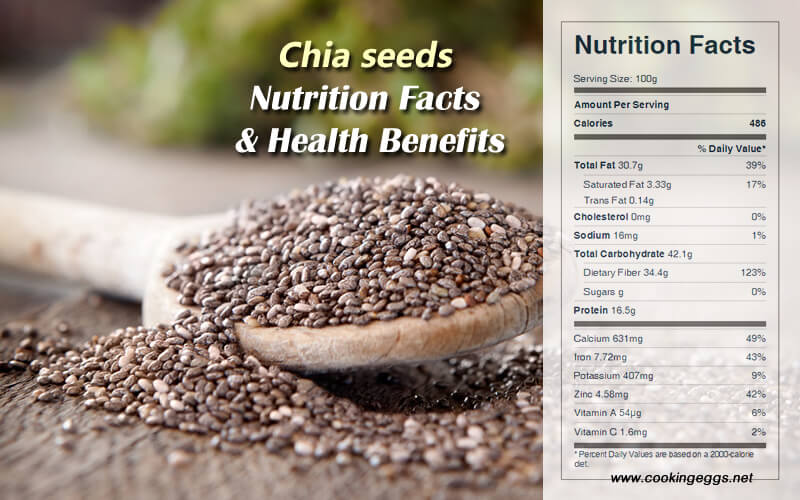Chia seeds Nutrition Facts & Health Benefits
Warning: A non-numeric value encountered in /www/wwwroot/www.cookingeggs.net/wp-content/plugins/nutrition-facts-label/nutrition-facts-label.php on line 384
Chia seeds are the edible seeds of Salvia hispanica. Though they are small in size, the amount of nutrients they hold is humongous.
Chia seeds may be added to other foods as a topping or put into smoothies, breakfast cereals, energy bars, granola bars, yogurt, tortillas, and bread. Unlike flax seeds, whole chia seeds do not need to be ground because the seed coat is delicate and readily digested, possibly improving nutrient bioavailability.
Chia seeds are an excellent source of omega-3 fatty acids, rich in antioxidants, and provide fiber, iron, calcium, phosphorus, niacin, magnesium, manganese, copper, molybdenum, and zinc. They are rich in omega-3 fatty acids, potassium, copper, calcium, phosphorus, and fiber as compared to flax seed.

Nutritional value of Chia seeds
Dried chia seeds contain 6% water, 42% carbohydrates, 16% protein, and 31% fat.
One ounce (28 grams) of chia seeds contains 11 grams of fiber, 4 grams of protein, 9 grams of fat (out of which 5 grams are omega-3s), 18% of calcium, 30% of manganese, 30% of magnesium, and 27% of phosphorus. It also includes the right amount of zinc, Vitamin B1, B2, B3, and potassium and is a rich source of antioxidants. It has just 137 calories and 1 gram of carbs, which are easily digestible.
One tablespoon of chia seeds provides 40 calories, 5 g carbohydrate, 2 g protein, 4 g fat, 5 g dietary fiber, 6 mg vitamin C, 76 mg calcium, 1.8 mg iron, 150 mg phosphorus, 38 mg magnesium, 85 mg potassium, 2406 mg omega-3 fatty acids, 792 mg omega-6 fatty acids, and 294 mg omega-9 fatty acids.
The fatty acids of chia seed oil are mainly unsaturated, with linoleic acid (17–26% of total fat) and linolenic acid (50–57%) as the major fats.
Chia seeds Nutrition Facts Label
Health Benefits of Chia seeds
Chia seeds are a real superfood! Chia seeds form a gel in the stomach that slows the conversion of carbohydrates to sugar, and the protein in the gel helps build muscle and other tissues.
Calcium is a vital nutrient for good bone health. One ounce of chia seeds contains 18% calcium of the daily value. It also provides the trace mineral boron, which aids in the absorption of calcium and makes the bone stronger.
Chia seeds are a great source of good fat and protein. The seeds are high in omega-3 fatty acids and anti-inflammatory. Chia seeds are a great source of polyunsaturated fatty acids: alpha-linolenic and linoleic. They contain 39% oil, which consists of 68% omega-3 and 19% omega-6 fatty acids. Their protein content also makes them a good source of plant-based protein, comprising 24% of their mass.
Insoluble fiber has a positive effect on our gut health. The fiber content in chia seeds is very high, roughly 35 grams per 100 grams. The insoluble fiber content serves as a prebiotic, which is food for our good gut bacteria so they can grow and proliferate in our colon. The short-chain fatty acids that are generated due to fiber fermentation in the colon help to decrease the pH of the intestine. Because the bad bacteria are not allowed to grow, it creates an environment where we can absorb minerals from the diet through an increase in our epithelial cells. A study on the effect of chia seeds on gut bacteria found it led to an abundance of lactobacillus and Bifidobacterium, the good gut bacteria.
Chia seeds are truly a functional food because they also have an antioxidant capacity. The major polyphenols in chia seeds are rosmarinic acid, daidzein, caffeic acid, mycertin, and quercetin. Studies have demonstrated that animals consuming chia seeds had an increase in the activity of antioxidant enzymes in the blood.
They can improve cholesterol levels and blood sugar levels, and they stimulate the immune system. Chia seed consumption helps maintain healthy blood sugar levels and provides good cholesterol needed for our body. Diabetic and gluten-allergic people can safely consume these seeds, as chia seeds are entirely gluten-free.